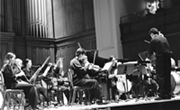

Say what you will about twentieth-century music, it is hard to play. Random bursts of sound, weird orchestrations, frequent cuts, and god-awful chords do not lend themselves to laid-back playing. Notations are often more description that staff; you simply have to dive in and play without fear. And this is exactly what the Contemporary music ensemble did Wednesday night.

A percussion fetishist would be particularly happy to look at the stage before the concert: a marimba, a xylophone, bells, bass and snare drums, timpani, and three gongs! The members appeared in an odd half-casual attire-all black, but more often than not in T-shirts or tank tops. Most of the time it was an intimate group, small, and facing the audience rather than the conductor.
The first piece, "Songs Without Voices" by Oliver Knussen, featured a traditional arrangement, but very loose composition. Dynamics were a bit shoddy at first, as was the energy; the performers really seemed not to attack the individual notes. The solos were all excellent, however, with the cellist distinguishing himself. The group kept together well, and the ending was superb, with a lovely crescendo to fall off, leading into a precisely played clarinet/oboe duet that ended gently and furtively.
"Gambit" was divided up into six sections (two sets of prelude-interlude-postlude), which proved confusing for both audience and musicians. The composer, Ben Johnson, was mainly known as a taper, and this was one of his few "traditional" pieces; it added more winds from the previous piece to the mix. Piano work was expert, jazzy and rhythmical, but a little stiff in some of the more swinging parts. An exacting drum solo was contributed, as was a sublime muted trumpet solo. Near the end, however, the tuning seemed a bit off, especially in the brasses. The cut-offs seemed nearly constant in this piece, so when the end was reached, the audience did not clap for a good ten seconds, unclear about whether a movement was done or the entire piece. Eventually, though, appreciative applause filled the room.
One of the nicest and best performed pieces of the evening was "Yu Ko" by Chou Wen-Chung. In this, one of his few originals, he attempted to imitate traditional Chinese instruments and affectations with western instruments and notation. For instance, fluttering alto flutes, muted trombones glissing in quarter tones, and rumbling bassoon notes. The pianist was kept busy plucking strings and hitting keys; she pulled it off with excellence. The percussion really shined in this, with wood blocks, gongs, and bass drums all sounding in place. Afterwards, conductor Timothy Weiss noted that "you'll probably never hear this piece again," and it was short, so they played it again.
Finally came the so-called sleeper, "Modules: An Intermezzo for Chamber Orchestra" by Mel Powell. An "experiment" consisting of a series of short, explosive segments, players were often on their own in terms of tempo and entrances. Somehow it all worked, however, and even sounded right; the violins and harpist particularly shone.
All in all, it was modernist music with a heart, rare pieces played very well, and even with a little feeling.
Temporary contemporaries: Obies played modern works in Wednesday's concert.(photo by Matthew Green)
Copyright © 1997, The Oberlin Review.
Volume 126, Number 6, October 10, 1997
Contact us with your comments and suggestions.